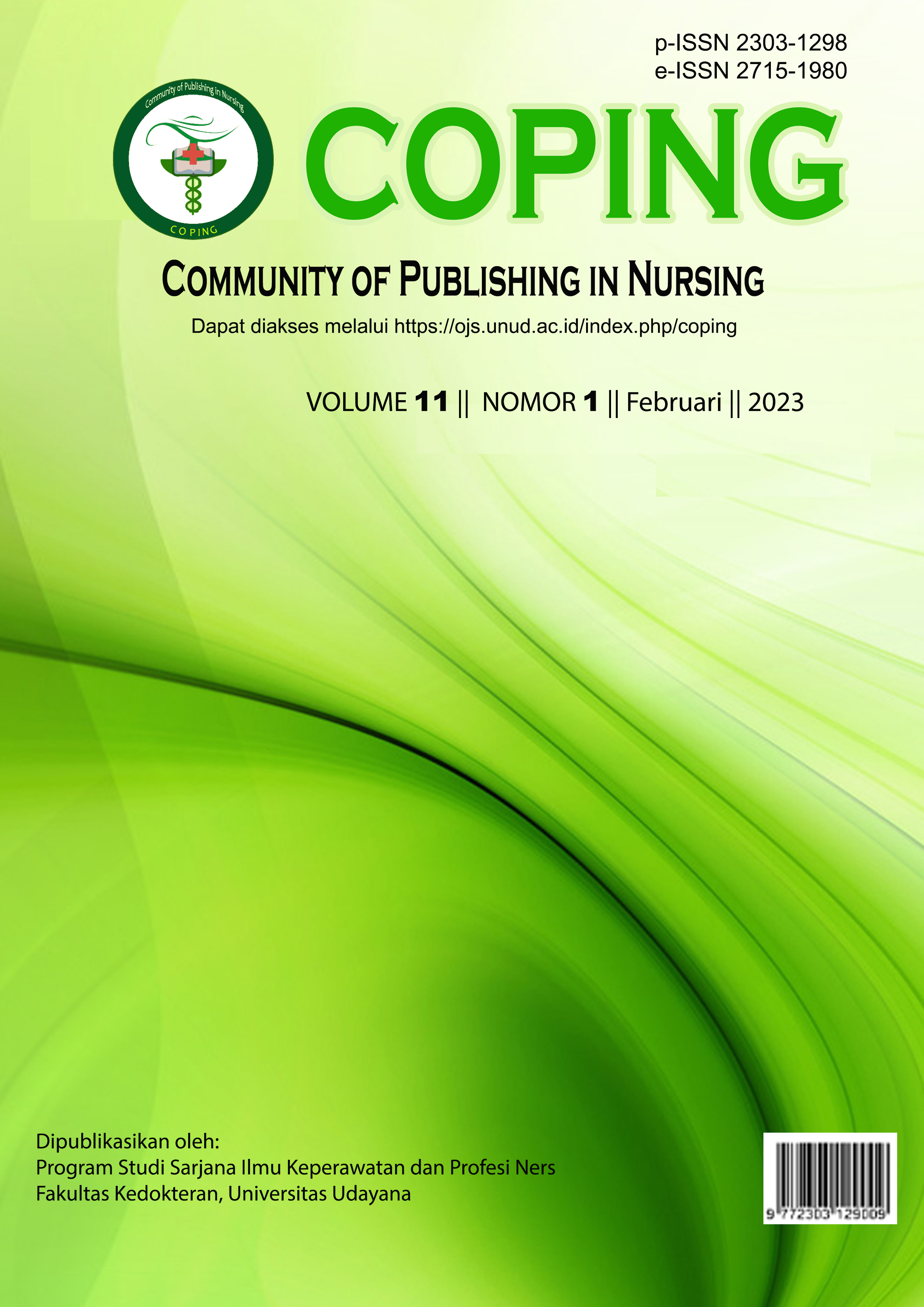EFIKASI DIRI BERHUBUNGAN DENGAN TINGKAT PROKRASTINASI AKADEMIK PADA MAHASISWA KEPERAWATAN
Abstract
Prokrastinasi akademik dapat terjadi pada mahasiswa dari berbagai bidang keilmuan, termasuk mahasiswa keperawatan. Salah satu faktor yang dapat berkaitan dengan prokrastinasi akademik adalah efikasi diri. Mahasiswa yang tidak percaya dengan kemampuannya, cenderung sulit berinisiasi untuk mengerjakan tugas. Penelitian ini bertujuan untuk mengetahui hubungan antara efikasi diri dengan prokrastinasi akademik pada mahasiswa keperawatan Universitas Udayana. Penelitian ini adalah penelitian deskriptif-korelatif dengan pendekatan cross sectional. Sampel terdiri dari 164 responden yang diperoleh menggunakan teknik probability sampling dengan jenis proportionate stratified random sampling. Pengumpulan data menggunakan kuesioner Tuckman’s Procrastination Scale (TPS) dan Academic Nurse Self-Efficacy Scale (ANSES). Pengumpulan data dilakukan dengan survei daring menggunakan google form yang dikirimkan melalui pesan siaran Whatsapp. Hasil penelitian ini menunjukkan terdapat hubungan negatif yang bermakna antara efikasi diri dengan prokrastinasi akademik dengan kekuatan hubungan sedang (p < 0,05; r = -0,401) yang berarti semakin rendah efikasi diri, maka semakin tinggi prokrastinasi akademik yang dialami. Sebanyak 48,8% mahasiswa keperawatan mengalami prokrastinasi akademik kategori sedang dan 50,6% mahasiswa keperawatan dengan efikasi diri kategori rendah. Hasil penelitian ini menyimpulkan bahwa efikasi diri berhubungan dengan tingkat prokrastinasi akademik pada mahasiswa keperawatan sehingga intervensi yang menargetkan peningkatan efikasi diri kemungkinan dapat membantu dalam menurunkan tingkat prokrastinasi akademik.
Downloads
References
Adelina, R. (2015). Hubungan antara efikasi diri dengan penyesuaian diri santri baru (Universitas Muhammadiyah Surakarta). Universitas Muhammadiyah Surakarta. Retrived from http://eprints.ums.ac.id/35428/
Bandura, A. (1989). Regulation of cognitive processes through perceived self-efficacy. Developmental Psycology, 25(5), 729-735. https://doi.org/10.1037//0012-1649.25.5.729
Brando-Garrido, C., Montes-Hidalgo, J., Limonero, J. T., Gómez-Romero, M. J., & Tomás-Sábado, J. (2020). Relationship of academic procrastination with perceived competence, coping, self-esteem, and self-efficacy in nursing students. Enfermeria Clinica (English Edition), 30(6), 398-403. https://doi.org/10.1016/j.enfcle.2019.07.013
Crary, P. (2013). Beliefs, behaviors, and health of undergraduate nursing students. Holistic Nursing Practice, 27(2), 74-88. https://doi.org/10.1097/HNP.0b013e318280f75e
Darmadi, I. P. Y. (2020). Prokrastinasi akademik mahasiswa ditinjau dari perbedaan angkatan. Universitas Sanata Dharma Yogjakarta.
Ferrari, J. R., Johnson, J. L., & McCown, W. G. (1995). Procrastination and task avoidance: Theory, research, and treatment. https://doi.org/10.1007/978-1-4899-0277-6
Ghosh, R., & Roy, S. (2017). Relating multidimensional perfectionism and academic procrastination among Indian univerisity students: Is there any gender divide? Gender in Management, 32(8), 518-534. https://doi.org/10.1108/GM-01-2017-0011
Ghufron, M. N., & Risnawita, R. (2012). Teori-teori psikologi. Jogjakarta: Ar.Ruzz Media.
Guo, M., Yin. X., Wang, C., Nie, L., & Wang, G. (2019). Emotional intelligence a academic procrastination among junior college nursing students. Journal of Advanced Nursing, 75(11), 2710-2718. https://doi.org/10.1111/jan.14101
Hakim, N. R., Prihandhani, I. S., & Wirajaya, I. G. (2018). Hubungan manajemen waktu dengan kebiasaan prokrastinasi penyusunan skripsi mahasiswa keperawatan angkatan VIII STIKES Bina Usada Bali. Widyadari, 19(2). https://doi.org/10.5281/zenodo.1470910
Handoyo, A. W., & Prabowo, A. S. (2020). Prokrastinasi akademik mahasiswa selama pembelajaran daring. Prosiding Seminar Nasional Pendidikan FKIP, 3(1), 355-361.
Klibert, J., Leleux-LaBarge, K., Tarantino, N., Yancey, T., & Lamis, D. A. (2016). Procrastination and suicide proneness: A moderated-mediation model for cognitive schemas and gender. Death Studies, 40(6), 350-357. https://doi.org/10.1080/07481187.2016.1141262
Kristanto, J., & Abraham, J. (2016). Decisional procrastination: The role of courage, media multitasking, and Planning Fallacy. 663-675. https://doi.org/10.15405/epsbs.2016.11.69
Kurtovic, A., Vrdoljak, G., & Idzanovic, A. (2019). Predicting procrastination:The role of academic achievement, self-efficacy, and perfectionism. International Journal of Educational Psychology, 8(1), 1-26. https://doi.org/10.17583/ijep.2019.2993
Lahdenperä, J. (2018). Comparing male and female students’ self-efficacy and self-regulation skills in two undergraduate mathematics course contexts. (January 2018). Retrieved from https://hal.archives-ouvertes.fr/hal-01849934
Liu, G., Cheng, G., Hu, J., Pan, Y., & Zhao, S. (2020). Academic self-efficacy and postgraduate procrastination: A moderated mediation model. Frontiers in Psychology, 11(July), 1-9. https://doi.org/10.3389/fpsyg.2020.01752
Lubis, I. S. L. (2018). Hubungan regulasi diri dalam belajar dan efikasi diri dengan prokrastinasi akademik mahasiswa. Jurnal Diversita, 4(2), 90. https://doi.org/10.31289/diversita.v4i2.1884
Muyana, S. (2018). Prokrastinasi akademik di kalangan mahasiswa program studi bimbingan konseling. Counsellia: Jurnal Bimbingan dan Konseling, 8(1), 45. https://doi.org/10.25273/counsellia.v8i1.1868
Nilufer, B. (2017). Understanding the academic procrastination attitude of language learners in Turkish universities. Educational Research and Reviews, 12(3), 108-115. https://doi.org/10.5897/err2016.3122
Nisa, N. K., Mukhlis, H., Wahyudi, D. A., & Putri, R. H. (2019). Manajemen waktu dengan prokrastinasi akademik pada mahasiswa keperawatan, 1(1), 29-34.
Noprianty, R. (2019). Jenjang karir perawatn dan kepuasan pasien terhadap kualitas pelayanan keperawatan. Jurnal Pendidikan Keperawatan Indonesia, 5(2). https://doi.org/10.17509/jpki.v5i2.17404
Przepiórka, A., Blachnio, A., & Siu, N. Y. F. (2019). The relationships between self-efficacy, self-control, chronotype, procrastination, and sleep problems in young adults. Chronobiology International, 36(8), 1025-1035. https://doi.org/10.1080/0740528.2019.1607370
Saman, A. (2017). Analisis prokrastinasi akademik mahasiswa (studi pada mahasiswa jurusan psikologi pendidikan dan bimbingan fakultas ilmu pendidikan). Jurnal Kajian Psikologi Pendidikan dan Bimbingan Konseling, 3(2), 55. https://doi.org/10.26858/jpkk.v0i0.3070
Sari, D. A. K. S. (2020). Prokrastinasi akademik mahasiswa dalam penyusunan tugas akhir di STIKES RS Baptis Kediri ditinjau dari self-efficacy. Jurnal Penelitian Keperawatan, 6(1). https://doi.org/10,32660/jpk.v6i1.450
Semiun, Y. (2020). Behavioristik: Teori-teori kepribadian. Yogjakarta: PT Kanisius.
Seto, S. B., Suryani, L., & Bantas, M. G. D. (2020). Analisis efikasi diri dan hasil belajar berbasis E-learning pada mahasiswa program studi pendidikan matematika. Prima Magistra: Jurnal Ilmiah Kependidikan, 1(2), 147-152. https://doi.org/10.37478/jpm.vli2.472
Sidkin, A. (2012). Pengaruh self-efficacy dan self-regulated learning terhadap prestasi belajar pada mahasiswa fakultas ekonomi Universitas Islam Negeri Syarif Hidayatullah. Universitas Islam Negeri Syarif Hidayatullah.
Supriyantini, S., & Nufus, K. (2018). Hubungan self-efficacy dengan prokrastinasi akademik pada mahasiswa USU yang sedang menyusun skripsi. Talenta Conference Series: Local Wisdom, Social, and Arts (LWSA), 1(1), 296-302. https://doi.org/10.32734/lwsa.vli1.179
Triana, K. A. (2013). Hubungan antara orientasi masa depan dengan prokrastinasi dalam menyusun skripsi pada mahasiswa fakultas ilmu sosial dan politik (Fisipol) Universitas Mulawarman Samarinda. EJournal Psikologi, 1(3), 280-291.
Visser, L., Schoonenboom, J., & Korthagen, F. A. J. (2017). A field experimental design of a strenghs-based training to overcome academic procrastination: Short and long-term effect. Frontiers in Psychology, 8(November), 1-12. https://doi.org/10.3389/fpsyg.2017.01949
Yanti, A. F. (2017). Efikasi diri dengan kesulitan belajar pada siswa di MTS Miftahul Ulum Pangkalan Balai Kabupaten Banyuasin III. Universitas Islam Negeri Raden Fatah Palembang.
Zhang, Y., Dong, S., Fang, W., Chai, X., Mei, J., & Fan, X. (2018). Self-efficacy for self-regulation and fear of failure as mediators between self-esteem and academic procrastination among undergraduates in health professions. Advanced in Health Sciences Education, 23(4), 817-830. https://doi.org/10.1007/s10459-018-9832-3

This work is licensed under a Creative Commons Attribution-NonCommercial 4.0 International License.







